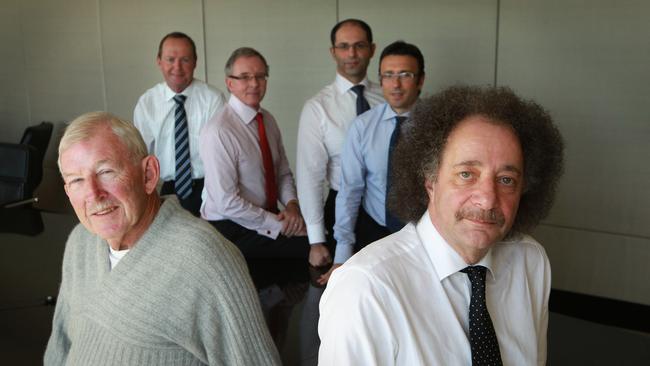Raider Brierley calls it quits at 81
Feted by Solomon Lew as “the original raider,” Sir Ron Brierley is retiring after 60 years.

Sir Ron Brierley, one of Australia’s most prolific and high-profile corporate raiders, is retiring from the boardroom after a six-decade career that redefined the way business is done and regulated.
Born in New Zealand, Sir Ron blasted on to the Australian corporate scene in the 1980s with his vehicle Industrial Equity Limited, which made a serious of audacious plays at a time when a new wave of entrepreneurs was shaking up the country’s staid boardrooms.
Over the decades, through IEL and the vehicle that followed it, Guinness Peat Group, he mounted raids on companies as diverse as brewer Carlton & United Breweries, energy company AGL, lottery operator Tatts and home builder AV Jennings.
His latest spearhead, Mercantile Investment Company, is still keeping the market interesting.
Last year it made a bid for Mark Bouris’s troubled mortgage broker Yellow Brick Road, and despite the bid failing it maintains a glowering presence on the share register, lurking just below the 20 per cent takeover threshold.
He also mentored generations of executives, influencing BHP director Malcolm Broomhead and the co-founder of market darling Afterpay, Anthony Eisen.
Yesterday the 81-year-old announced his “imminent retirement” from his role as chairman of Mercantile.
“Due to age and health issues, I can no longer give the total commitment to the company which it requires and which shareholders deserve,” he told the ASX.
If shareholders approve, Mercantile is to be merged with another activist investor, Sandon Capital Investments, which is chaired by Mercantile director Gabriel Radzyminski.
Some in the market couldn’t believe Sir Ron was finally calling time.
“Yeah, right, I’ll believe it when I see it,” one long-time associate said when The Australian called to break the news.
Retailer Solomon Lew said Sir Ron was “the original raider, and in my opinion he’s also still the best”.
The pair have a long association — Sir Ron did a stint as chairman of Mr Lew’s company, Premier Investments, and helped Premier sell its 5.9 per cent of Mr Lew’s old stalking horse, Coles, to Wesfarmers for $1.1bn in 2007.
“For many years, the mere mention of his name struck fear into the hearts of lazy company board directors,” Mr Lew said. “I hold him in the highest regard, not only for his huge success, but also for the manner in which he achieved it.
“Ron is a man of integrity, and his word is his bond. He consistently delivered great outcomes on his investments, where some others had a hit-and-miss approach.
“I wish Ron a happy and enjoyable retirement, and however he spends his time I am sure he will still find ways to cause trouble in the nicest possible way.”
Ariadne Australia executive director Gary Weiss, who has worked for Sir Ron “on and off since 1984”, said it was the end of an era. “Back in the 80s there was a lot of tilting at establishment windmills,” he told The Australian. “The activism we did then was quite novel.”
Mr Weiss said Australia now had a “much greater acceptance of shareholder activism”.
The tactics used by IEL and GPG also forced governments to rewrite the rule book.
“We were very significant contributors to Australian jurisprudence and to the way takeovers are regulated,” said Mr Weiss, who trained as a lawyer.
Sir Ron — then plain Mr Brierley — founded his first vehicle, Brierley Investments, in 1961, using the proceeds from his sharemarket tip sheet, New Zealand Stocks & Shares.
It went on to be New Zealand’s largest listed company.
In Australia IEL’s prime time came in the buccaneering 1980s, when it made one of the first significant raids of the decade, a bid for Carlton & United Breweries in 1983. “That was real Melbourne establishment,” Mr Weiss said.
“In relation to that, this little company from South Australia called Elders, run by John Elliott, came to its rescue.”
Mr Weiss said Sir Ron’s 1985 attack on one of Australia’s oldest listed companies, AGL, was one of the “more audacious ones”.
“We accumulated a 41.5 per cent stake in AGL where no-one knew about it, including AGL,” he said. “We found a way in where we weren’t required to disclose our shareholding.” Under pressure from institutional investors, in 2011 GPG began selling off assets and returning capital to shareholders — a process that itself spun out businesses that went on to make others rich, including Coates, Bellamy’s, Capilano Honey and the technology behind Afterpay, while Sir Ron moved on to Mercantile.
Mr Radzyminski said he would “carry the torch” left behind by Sir Ron if shareholders approved the merger between Mercantile and Sandon.
“The reality is there are very few companies in Australia that he has not had some influence on,” he said.
“If you put Ron in the middle and traced lines of who has worked with him, for him, and companies that have emerged, you would find a network that is beyond comprehension.
“He’s mentored and nurtured a huge amount of exceptional talent in Australian business.”
Retirement is unlikely to leave Sir Ron with nothing to do.
His hobbies include cricket, stamp collecting — a world where he was known as “Lionheart” — and reading annual reports.



To join the conversation, please log in. Don't have an account? Register
Join the conversation, you are commenting as Logout